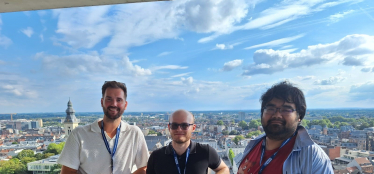Paper Presentation at EGOV2024

The EGOV24 (IFIP EGOV-CeDEM-EPART 2024) conference is a scientific conference dedicated to the broader areas of e-Government and e-Democracy, including facets like Digital Government, e-Participation, Open Government, Smart Government, AI Government, GovTech, Algoritmic Governance, and related topics to digitalization and government.
This year, the conference took place in September in Ghent and Leuven, Belgium. In Ghent, a Junior Faculty School on “Academic Career Building” was organized to network young researchers before the official program begun. In Leuven, the conference program continued for three days with exciting presentations and social activities. The Chair of Information Systems and Information Management was represented by three members, each of whom presented an accepted paper:
Binh An Patrick Nguyen and Hendrik Scholta: “A method for the collaborative and semi-automated generation of conceptual models from legal regulations in public organizations” (2024).
The paper is about how concept models can be derived from laws in a collaborative process. In particular, the focus was on the interaction between digitalization officers/IT and the specialist offices/legal experts. For the method, interviews were conducted with digitalization officers from cities to determine the initial prerequisites and requirements. The improved method was demonstrated in further interviews and the subsequent feedback was integrated into the current version as presented in the paper.
David Nowak and Bettina Distel: “Trust in Times of Cyber Crisis: Understanding Organizational Trust Repair in the Public Sector” (2024).
The paper deals with how a municipal IT-provider affected by a cyberattack tried to repair the trust of its customers. In the case analyzed, the affected IT-provider primarily tried to deal with the effects of the crisis through transparent communication and compensation in the form of emergency assistance offers. However, not all partners were equally informed about the recovery at the beginning of the crisis and two cities had already created their own interim solutions before the IT-provider was able to make emergency offers, which reduced the effectiveness of the compensation measures. The case shows that measures to repair trust should be combined with those to manage a cyber crisis.
Michael Koddebusch, Bettina Distel, Marco Di Maria, Paul Brützke and Jörg Becker: “Getting Rid of It: An Unlearning Perspective on Digital Government Competences” (2024). The paper was honored with the Best Paper Award in the category ‘Most Innovative Research Contribution’.
In this article, the authors look at the concept of ‘unlearning’. Unlearning is the conscious discarding of outdated behaviors, routines and skills that (in our context) stand in the way of digital transformation. Using a focus group study, the authors have developed a framework that identifies such obsolete competencies at an individual and organizational level to promote their unlearning.

